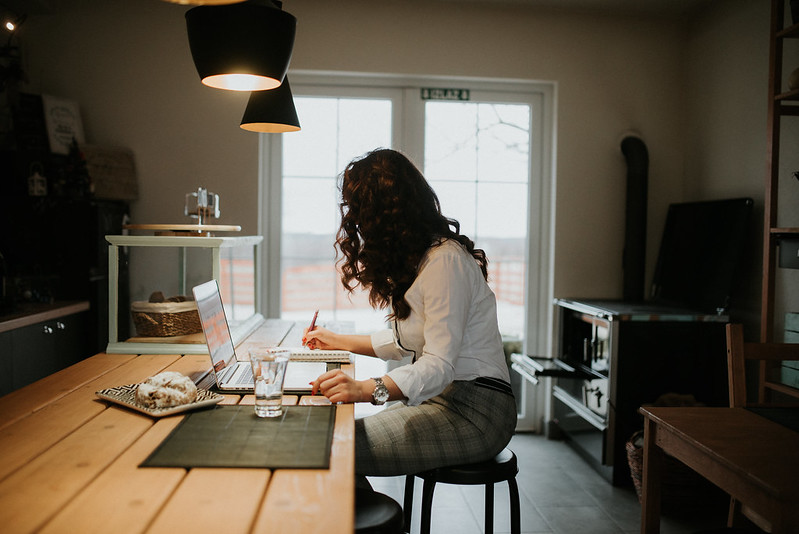photo by Nenad Stojkovic
Working from home is hard. Really, really hard.
And in these unprecedented/extraordinary/trying/strange/unusual/ whichever-email-copy-platitude-you-prefer times, many of us find ourselves forced to invite Work into our private spaces for the first time. In the best of times, our homes are places where we should feel our most in control. Being at home should carry a sense of agency and safety: the freedom to care for ourselves and our loved ones, to rest, to relax, and to simply exist as a human without experiencing demands on our time by our employment.
Thanks to COVID-19 and the necessary lockdowns, our homes have become haphazard stand-ins for every facet of public life. In the absence of public space (a resource already endangered by the loss of parks and libraries– places you can be without having to buy anything) our homes have taken the roles of schools, doctor’s offices, social clubs, and workplaces.
The boundaries between home and work have dissolved and with them the boundaries between personal time and work time. The increasing economic instability that many of us are experiencing also drives an impulse to make more financially lucrative use of our downtime: OnlyFans, paid surveys, copy editing.
In “How to Do Nothing,” Jenny Odell reminds us:
The removal of economic security for working people dissolves those boundaries–eight hours for work, eight hours for rest, eight hours for what we will–so that we are left with twenty-four potentially monetizable hours that are sometimes not even restricted to our time zones or our sleep cycles.
Working from home, especially in freelance roles, compromises people’s ability to differentiate between Home Time and Work Time. Quarantine only exacerbates this, as “boundaries” around how we spend our time can no longer rely on discrete physical locations to separate our work and personal activities.
We run an extreme risk of becoming so entrenched in our work mindsets that we’re unable to live as people with unique, self directed motivations, desires, likes, and imaginations. My fear is that the new normal of so many people working from home, with nebulous hours, in immense economic precarity, will permit companies to pursue further incursions into our personal time and personal lives that will affect us long after stay-at-home orders are no longer necessary. What is normatively expected of workers’ time and effort will become more demanding, and the quality of that time and effort will be further attached to our lives as people,not just our capacity as employees.
For these reasons it’s crucial–for yourself, for your community, and for society as a whole–that we learn to draw serious boundaries between our personal lives and our work lives. For most of us, we will not be able to cast off the exploitative demands placed upon us by capitalist productivity before quarantine is lifted. We must take short-term steps to mitigate work’s influence on our personal beings.
As an actor (AKA a very passionate freelancer in an extremely competitive field with weird hours whose entire income is based on constant evaluation of their body, personality, appearance, voice, and mannerisms) I’ve had to take conscious steps to delineate my Work Self from my Personal Self well before COVID-19 started asking us to combine our Work Place and our Personal Place. Today, I share these tips with you, for the good of everyone who dreams of a sense of self, daily activities, and life outside of employment.
1. Prioritize “Active Rest”
Imagine: You’re sitting on the couch, debating whether to start one of your many home work tasks or to watch a situationally appropriate number of episodes of your favorite show first.
While this mental storm rages, you scroll through the same four apps on your phone over and over, receiving no new important information or enjoyment from this process. Before you know it, so much time has passed, you no longer have time to perform either your necessary work or your desired leisure activity. Sound familiar? Me too! Only like every day!
Countering this inertia takes decision making power and a practice that I’ve been calling Active Rest. This means fully committing to rest and leisure activities, instead of half-assing them solely to procrastinate work. It means listening to your thoughts and understanding whether you really intend to begin a task soon, or if your mental presence is better spent elsewhere–like on a nap, for example.
It also means knowing that it’s okay to focus your energy on non-work related tasks, and it’s still a meaningful use of your time. Doing so will not only reduce the number of hours you spend in this weird task avoidant haze but will also help you better value and be present in the activities you can choose to do.
2. Delineate Physical Space and Mental Space
Many of us have heard advice to create a specific workspace in our homes for employment-related tasks. However, for those of us in small apartments, shared spaces, and family homes, this can be impossible.
Whether or not you have the space to physically delineate a work environment, you can mentally delineate it with sensory experience. This can be as simple as changing the chair you normally sit in, the side of the bed you lay on, or the direction you face while working. You can use a specific playlist or set of sounds (Lofi hip hop beats to study to? Eh?) to listen to only while working. You can use scents, like a candle or incense. You can drink a particular type of tea.
All of these, however small they may seem, can dramatically affect your mental presence while working or not working from home.
3. Give your Downtime Significance
Early on in quarantine, I would only put on makeup and clothes if I had what I deemed a good enough reason. These reasons were almost always about being presentable for work. Soon, this extended to showering, and later this extended to feeling any sense of importance about what I was doing. Obviously, this made me miserable.
Think of your work not as events in an otherwise irrelevant stream of nothing, but one of many compelling Things you may be up to on a particular day. Instead of living in quiet anticipation of working, treat your leisure activities with as much or more significance than your work activities, and find ways to commemorate them accordingly.
For me, this lies in getting dressed as if for an exciting activity, but really could be anything from having a morning routine, eating intentional meals, taking photographs, to keeping a diary of interesting things I’ve done.
Treating your leisure activities with significance will remind you that actions outside of work also contribute to your sense of purpose. (I’ve started dressing up on warm days out of respect for the sun. I highly recommend it.)
4. Find Fulfilling Projects with No Monetary Value
I know too many people who claim not to have any hobbies. In reality, these people once had hobbies but are now too swamped with work to devote time to them. Or they have hobbies but have turned to monetize them to the point where they’re no longer enjoyable or natural.
You need to get your hobbies back! Start with an activity you can perform at will for short periods of time, like playing an instrument or a socially isolated sport. It’s okay to try things once and move on from them–you’re not beholden to anything but your own enjoyment. It will feel unnatural at first, but that’s only because we’ve been taught to devalue any activity that doesn’t facilitate us making money in some way.
Once you’ve trained your stamina for hobbies and can fully appreciate just having fun for fun’s sake, find a longer-term project you can put sustained effort and enjoyment into.
For me, this has been gardening and fermentation projects, and I’ve seen people enjoy long-term activities like embroidery, language-learning, push-up challenges, and creating art. The only rule is you MUST NOT monetarily profit from these in any way–but you’ll enjoy them so much more as a result.
5. Learn About Labor Issues
For me, nothing helps me solve a problem better than understanding it. If I can track how a problem originates, functions, moves, and creates more problems down the line, I feel empowered and strong in my attempts to ameliorate it, even if it’s in a small, personal way.
When work threatens to overwhelm my sense of self, I remember that corporate structures benefit from my feeling like I only exist to work. Rather than believing I only exist to generate capital, political awareness arms me with the knowledge that I exist for so much more in life: myself, my loved ones, and my many interconnected communities.
Some books that I’ve found particularly motivating in terms of labor, enjoyment, and culture are the aforementioned “How to Do Nothing” by Jenny Odell, “Pleasure Activism” by adrienne maree brown, and “Kids These Days” by Malcolm Harris. These are only a small selection of the many amazing books, articles, manifestos, protest histories, studies, art pieces, zines, tweet threads, tumblr posts, interpersonal conversations, and more out there to learn from.
The goal of all these suggestions is essentially bolstering the importance we place on non-work related activities in our lives. We believe that our lives mean more than who signs our paychecks, but putting that belief into practice can be difficult, even when the world is open to exciting, serendipitous, diverse experiences. Doing so when many of our worlds consist of one or two rooms is even harder.
Capitalist oppression benefits from workers feeling hopeless about the richness of their lives outside of work. To quote the ever classic Karl Marx in “Human Requirements and Division of Labor Under the Rule of Private Property”:
The less you eat, drink and read books; the less you go to the theatre, the dance hall, the public house; the less you think, love, theorize, sing, paint, fence, etc., the more you save-the greater becomes your treasure which neither moths nor dust will devour-your capital. The less you are, the more you have. The less you express your own life, the greater is your alienated life- the greater is the store of your estranged being.
Rather than further alienating ourselves from the content of our own lives, let’s maintain our commitment to thinking, loving, theorizing, singing, painting, fencing. The ability to stay home is a privilege and given that federal aid is only distributed to those with social security numbers and low-income workers are being called back into non-essential jobs, it’s a privilege quickly becoming scarce.
The incursion of work into our home lives during a pandemic is a crisis of capitalism. Practicing my tips will not fix the structural work and productivity problems our society has. But those of us working from home can help by staying at home, and by combating this reverence for capitalistic production wherever we can–starting with our own lives.







Be First to Comment